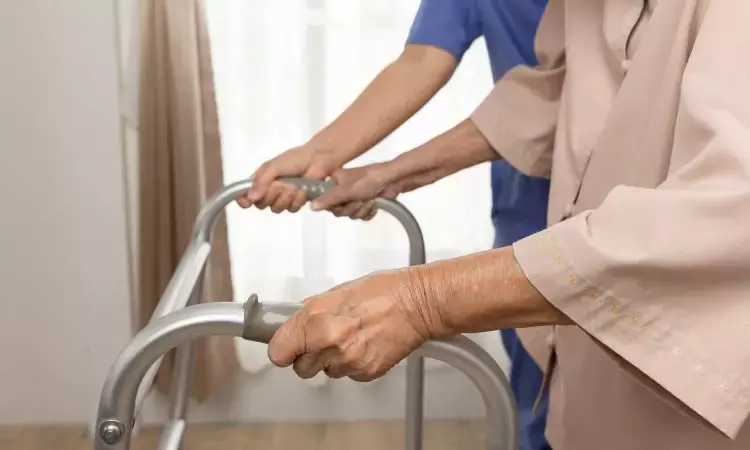- Home
- Medical news & Guidelines
- Anesthesiology
- Cardiology and CTVS
- Critical Care
- Dentistry
- Dermatology
- Diabetes and Endocrinology
- ENT
- Gastroenterology
- Medicine
- Nephrology
- Neurology
- Obstretics-Gynaecology
- Oncology
- Ophthalmology
- Orthopaedics
- Pediatrics-Neonatology
- Psychiatry
- Pulmonology
- Radiology
- Surgery
- Urology
- Laboratory Medicine
- Diet
- Nursing
- Paramedical
- Physiotherapy
- Health news
- Fact Check
- Bone Health Fact Check
- Brain Health Fact Check
- Cancer Related Fact Check
- Child Care Fact Check
- Dental and oral health fact check
- Diabetes and metabolic health fact check
- Diet and Nutrition Fact Check
- Eye and ENT Care Fact Check
- Fitness fact check
- Gut health fact check
- Heart health fact check
- Kidney health fact check
- Medical education fact check
- Men's health fact check
- Respiratory fact check
- Skin and hair care fact check
- Vaccine and Immunization fact check
- Women's health fact check
- AYUSH
- State News
- Andaman and Nicobar Islands
- Andhra Pradesh
- Arunachal Pradesh
- Assam
- Bihar
- Chandigarh
- Chattisgarh
- Dadra and Nagar Haveli
- Daman and Diu
- Delhi
- Goa
- Gujarat
- Haryana
- Himachal Pradesh
- Jammu & Kashmir
- Jharkhand
- Karnataka
- Kerala
- Ladakh
- Lakshadweep
- Madhya Pradesh
- Maharashtra
- Manipur
- Meghalaya
- Mizoram
- Nagaland
- Odisha
- Puducherry
- Punjab
- Rajasthan
- Sikkim
- Tamil Nadu
- Telangana
- Tripura
- Uttar Pradesh
- Uttrakhand
- West Bengal
- Medical Education
- Industry
Review Decodes Respiratory Sarcopenia: Risk Factors, Clinical Implications, and Gaps

India: Respiratory sarcopenia (RS) is an emerging condition characterized by the progressive loss of skeletal muscle mass and strength in the respiratory muscles, specifically affecting the diaphragm and intercostal muscles. In a recent scoping review published in the International Journal of Diabetes in Developing Countries, the lead author, Dr. Raju Vaishya from the Department of Orthopaedics, Indraprastha Apollo Hospitals, New Delhi, highlighted the importance of this condition, which affects patients with generalized sarcopenia. Dr. Vaishya shared his insights with Medical Dialogues on the condition’s pathophysiology, clinical presentation, and implications for management.
RS differs from generalized sarcopenia, which involves muscle loss throughout the entire body due to factors like aging and chronic diseases. According to Dr. Vaishya, RS specifically impairs respiratory muscle function, leading to difficulties in ventilation, shortness of breath, fatigue, and an increased risk of respiratory failure. This distinction has significant clinical implications, as RS requires targeted interventions to address patients' respiratory and overall muscle health.
"Unlike generalized sarcopenia, which is often associated with mobility issues and comorbidities such as osteoporosis, RS directly affects respiratory health," Dr. Vaishya told Medical Dialogues. He emphasized the need for clinicians to recognize RS as a distinct condition that can complicate respiratory diseases, particularly in older adults or those with chronic diseases like COPD. The subtle symptoms of RS can easily be confused with other respiratory conditions, making early diagnosis crucial for effective management.
Dr. Vaishya elaborated on the diagnostic challenges clinicians face in identifying RS. "RS often presents with symptoms such as fatigue, dyspnea, and reduced exercise tolerance, which can be mistaken for other respiratory diseases. Therefore, accurate diagnosis relies on tools such as spirometry, respiratory muscle strength testing, and CT imaging," he explained. Additionally, emerging biomarkers related to inflammation and malnutrition may offer valuable insights into the presence and severity of RS.
The review also pointed out that research on RS remains limited. Dr. Anoop Misra of Fortis C-Doc Hospital, New Delhi, a coauthor, acknowledged the need for further studies to establish standardized diagnostic criteria, explore pathophysiological mechanisms, and assess interventions. "The scarcity of literature hampers our ability to draw concrete conclusions about RS. We need more large-scale, longitudinal studies to determine the most effective treatments and interventions for this condition," he said.
Dr. Vaishya also discussed the significance of multidisciplinary approaches in treating RS. He stressed the importance of integrating physical therapy, nutritional support, and respiratory rehabilitation to improve muscle strength and endurance in affected individuals. "As we learn more about RS, we must develop evidence-based guidelines to enhance patient care and improve outcomes," he concluded.
As research into RS continues to grow, clinicians are encouraged to remain vigilant in assessing respiratory and muscle function in at-risk populations, such as older adults and individuals with chronic diseases. With more studies underway, the future holds promise for better understanding and managing respiratory sarcopenia, ultimately improving patient care and quality of life.
Reference:
Vaishya, R., Misra, A., Nassar, M. et al. Respiratory sarcopenia: A scoping review of the current literature. Int J Diabetes Dev Ctries (2025). https://doi.org/10.1007/s13410-025-01460-7
Dr Kamal Kant Kohli-MBBS, DTCD- a chest specialist with more than 30 years of practice and a flair for writing clinical articles, Dr Kamal Kant Kohli joined Medical Dialogues as a Chief Editor of Medical News. Besides writing articles, as an editor, he proofreads and verifies all the medical content published on Medical Dialogues including those coming from journals, studies,medical conferences,guidelines etc. Email: drkohli@medicaldialogues.in. Contact no. 011-43720751


